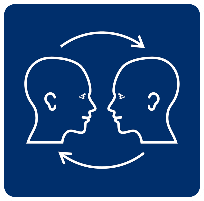- If I have to go into hospital, can I use my communication aid?
You can use a communication aid in hospital. Be aware that the nurses and doctors working in hospital will not be as familiar with the aid as you are. Try to keep it out where it can be seen and you can access it easily. You may find accessing and positioning your aid challenging, but your family or PA could help with this. They can also tell the nurses about your aid and how it helps you to communicate. You may find that a low-tech page with keywords or picture symbols is more practical in a hospital setting.
- How can I support someone who has lost their communication?
If you need to communicate with someone who you think may have lost some of their communication skills, there are specific things you can do to help them understand you.
- First, make sure you have their attention and that they can see your face clearly.
- Check how they can signal “yes” and “no” to you, for example eye blinks, head nods, vocalisations, gestures. This will make conversation much easier for both of you.
- Use simple words and sentences to communicate your message. If you are using “yes” “no” questions only ask one question at a time.
- Use gestures to support your message, and then give them time to understand what you have said.
- If you think they may be able to read, try writing down the message as well. If you have a picture, graphic or object related to your message handy, show it to the person. Try to find out if they can understand or produce written words or pictures of items.
- Try to confirm what you think they communicated by repeating their message.
As an example, if a nurse is pouring some water with her back turned to a patient and says “would you like a drink?”, the patient is unlikely to be able to see or hear them. A better approach if for the nurse to stand near the patient, get their attention and then ask clearly, “water?”, while miming drinking from a cup.
If in doubt ask the nursing staff to contact a speech and language therapist who will be able to provide you with individual guidance.
- Who can help me if I lose my communication or my speech?
A speech and language therapist is the best person to advise on communication and speech if those skills have been impaired. In the hospital, the nursing staff can contact the SLT department and ask a therapist to see you on the ward. Don’t forget, when you are discharged you can also ask your GP to refer you to a therapist.
- How can a therapist help?
A speech and language therapist may start by asking you about yourself, your family and your circumstances. They will work with you to assess the skills that you have and create a plan of interventions or therapy. They will then set goals for your communication recovery.
See also
- FAQs – AAC and Autism Spectrum Disorder (ASD)
- FAQs – AAC and cerebral palsy (CP)
- FAQs – AAC and developmental difficulties
- FAQs – AAC and employment
- FAQs – AAC and general paediatric care
- FAQs – AAC and hospitalisation
- FAQs – AAC and locked-in syndrome
- FAQs – AAC and Parkinson’s Disease (PD)
- FAQs – AAC and stroke and aphasia
- FAQs – AAC and training
- FAQs – AAC assessment and clinical decision-making
- FAQs – the law, policy and services






